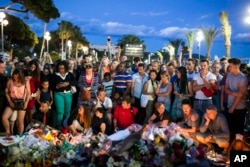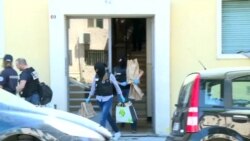French police Sunday released the estranged wife of the truck driver who ran down nearly 300 Bastille Day revelers in the French resort of Nice, but are still questioning six others to see if the attacker was acting alone.
The woman, the mother of attacker Mohamed Lahouaiej Bouhlel's three children, was arrested Friday. She was detained hours after Bouhlel drove a 19-ton refrigerator truck at 90 kilometers an hour along Nice's Mediterranean shoreline Promenade des Anglais, mowing down people over a 2-kilometer path, killing 84 of them.
Her lawyer told French television she is no longer in touch with him, after kicking him out of their house when he physically abused her.
Authorities believe that Bouhlel sent a text message to someone just 18 minutes before launching the truck attack, saying, "Bring more weapons, bring five of them to C," although it was unclear what the letter C referred to.
Among the six still in custody were a man and a woman arrested Sunday, but police gave no indication why they were being held.
A grieving France was observing the second of its three days of national mourning for the 84 people, including 10 children, killed in the attack and the more than 200 injured. Authorities said 85 people were still hospitalized, with 18 of them in critical condition.
The Islamic State terror group has claimed responsibility for Thursday's attack in a statement published in an IS media outlet, calling the attacker a "soldier."
It remains unclear whether there was any direct connection between the French-Tunisian attacker and the terrorist group. French Prime Minister Manuel Valls said authorities "now know that the killer radicalized very quickly."
But authorities said said he was "totally unknown" to French intelligence services. U.S. Secretary of State John Kerry said American authorities also had no prior knowledge of the attacker, adding that when someone has been radicalized recently, finding them is "worse than a needle in the haystack."
As of Sunday, no evidence had emerged of Bouhlel's sudden transformation from someone with no apparent interest in Islam. Relatives and friends said they knew the 31-year-old Bouhlel as someone who at least until recently drank alcohol, smoked marijuana and ate pork, traits unlikely for a devout Muslim.
"The claim on Saturday morning by Islamic State and the fast radicalization of the killer confirms the Islamist nature of this attack," Valls said, adding that the Islamic State "gives unstable individuals an ideological kit that allows them to make sense of their acts...this is probably what happened in Nice's case."
The promenade along the Mediterranean is now lined with flowers and candles, transformed into a makeshift memorial to the victims. The area has largely returned to normal with tourists and locals frequenting the many cafes and night spots in Nice.
Bouhlel, who lived in Nice, was suspected by local police to have committed criminal offenses. In March, he was given a suspended, six-month sentence for armed violence that took place in January. Relatives living in Tunisia told news agencies that he had psychological problems before leaving for France in 2005. His father said Bouhlel had problems from 2002 to 2004 "that caused a nervous breakdown."
'Facing a struggle'
In an address to the nation, French President Francois Hollande said the attack was done "to satisfy the cruelty of an individual and maybe a group." Speaking after visiting the hospital where victims were treated, he also said France was "facing a struggle which will be long.''
Hollande said France's state of emergency, set to end later this month, will be extended another three months. He has also enacted Operation Sentinel, introduced after terror attacks in January 2015 that allow 10,000 extra military personnel to boost the ranks of security forces across the country. He said France will strengthen its roles in Syria and Iraq. "We will continue striking those who attack us on our own soil," Hollande said.
Thursday's slaughter was the third major terrorist attack in France since last year. A coordinated attack in Paris on November 13 killed at least 130 people in a strike claimed by Islamic State, and a series of attacks in January 2015 that began with an assault on the offices of the satirical magazine Charlie Hebdo killed 17 people.








